
views
Nurturing Your Physical Health

Nourish your body with healthy foods. Instead of reaching for junk foods when you’re hungry, go for more fruits, veggies, whole grains, and lean proteins. These foods will nourish your body, keep you feeling full for longer, and help you to have more energy every day. For example, you could have apple slices with 1 to 2 tablespoons (15 to 30 g) of peanut butter for a snack. Or, make a healthy turkey sandwich for your lunch with whole wheat bread, a few slices of turkey, lettuce, tomato, and mustard.
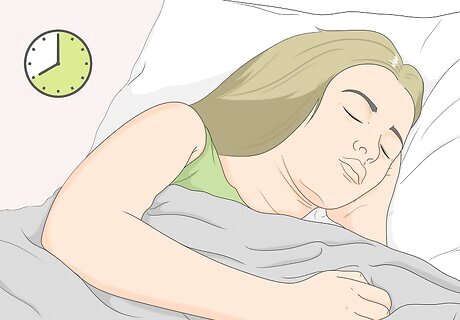
Sleep for at least 8 hours every night. Being well rested will help you to feel your best the following day, so go to bed early enough each night to get this amount of sleep. Turn off your phone, tablet, computer, and TV at least 30 minutes before you turn in and do something relaxing to wind yourself down. Try taking a warm shower or bath before you put on your pajamas. Have a cup of caffeine-free herbal tea, such as chamomile or peppermint. Listen to some relaxing music or read a book in bed.

Exercise for 30 to 60 minutes on most days of the week. Getting regular exercise is an important way to take good care of your health. Make sure to choose an activity that you like so that you will actually want to do it! For example, if you like dancing, try taking dance classes or dancing along to music in your bedroom. If you enjoy ice skating, hit the rink a few times per week. If you’re a fan of running, join a runner’s club in your area.
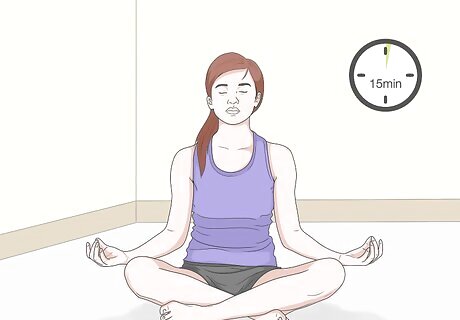
Relax every day for at least 15 minutes. Relaxation is important for your physical and mental health, so make it a priority! Plan to spend at least 15 minutes every day doing something that you find relaxing. Some activities you might try include: Deep breathing, which is a quick and easy way to experience a sense of calm. Meditation, which can help to quiet your mind and relieve stress. Yoga, which is an effective form of exercise and a great way to relax. Progressive muscle relaxation, which can help reduce everything from headaches to anxiety.
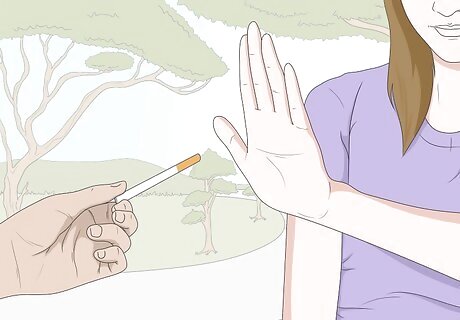
Steer clear of cigarettes and drugs. These substances are bad for you and you will not be taking good care of your body if you use them. Cigarettes put you at a higher risk of all kinds of diseases, from cancer to heart disease to asthma. Drugs lower your inhibitions and put you at risk of injury and death from risky behaviors or overdose. Just say “no” if someone offers you drugs! If you are of the legal drinking age and decide to drink alcohol, do so in moderation. For women, this means no more than 1 drink per day.
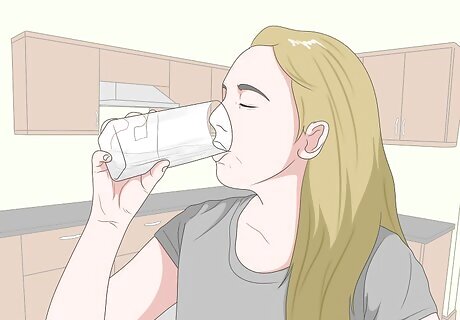
Drink plenty of water to stay well-hydrated. Water is the best thing to drink since it hydrates your body without added sugar. However, there’s no specific amount of water that you should drink every day. Drink water whenever you’re thirsty or sweaty to stay hydrated. Keep a water bottle on hand and take sips of it throughout the day any time you feel thirsty or after getting sweaty, such as from exercising. Refill your water bottle as needed.Tip: If you don’t like the taste of plain water, flavor it with a splash of juice, a twist of lemon or lime, or a few cucumber slices.
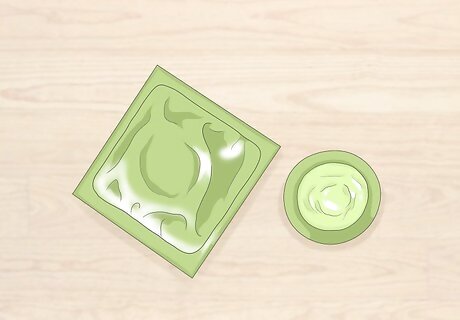
Practice safe sex if you’re sexually active. If you’ve recently started having sex, then it’s important to keep yourself safe whenever you do so. Insist that your partner wears a condom every time. Keep some in your purse or backpack so that you’re always prepared. If they refuse to wear a condom, do not have sex with them! Sexually transmitted diseases are common and anyone can get one. You can visit a local clinic to get free condoms and contraceptives.
Maintaining Good Hygiene
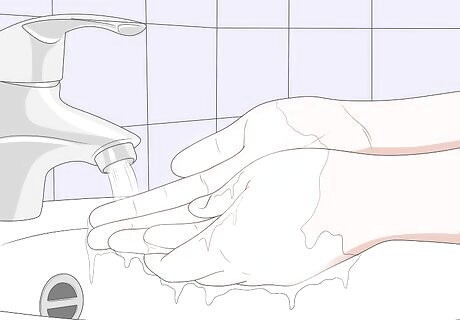
Wash your hands after using the bathroom and before eating. Hand hygiene is important for protecting yourself from germs and bacteria that collect on your hands throughout the day. Hold your hands under warm, running water and lather hand soap between them for 20 seconds to get them clean. Then, rinse your hands thoroughly and pat them dry with a clean, dry towel.
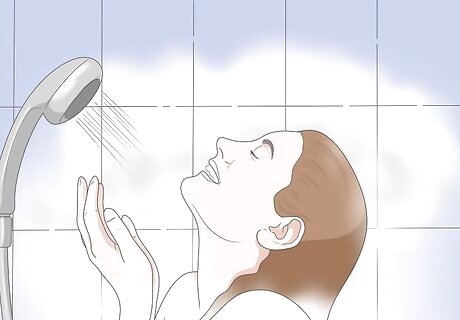
Shower or bathe every day. This will help you to stay clean and fresh. Wash your body thoroughly with soap or a body wash. Pay more attention to your armpits, vagina, and under your breasts. Allow the water to run over these areas a little longer than others to ensure that they are clean. Then, dry yourself off with a clean, dry towel. You can also shave your legs and underarms while you’re in the shower or bath if you want to remove excess body hair. However, this is totally optional! If you don’t want to shave, then don’t worry about it. Apply lotion to your body after you shower if your skin seems dry. Tip: You may want to bathe twice daily when you’re on your period. You’re more likely to develop odors during your period, so taking a shower in the morning and at night may be helpful.
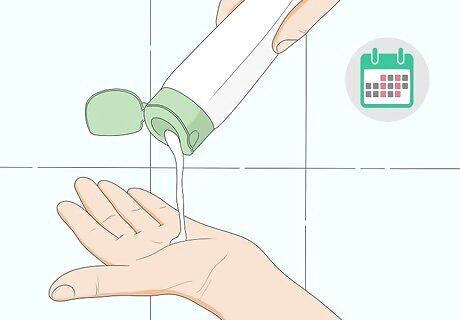
Shampoo and condition every other day, or more often if needed. How often you need to shampoo your hair will depend on whether or not it is oily. If your scalp produces a lot of oil, then you may need to wash it every day. However, if you have a normal or dry scalp, then you can wash your hair once every other day or possibly even every 3 days. Focus on washing your scalp when you shampoo your hair and then apply conditioner to the ends of your hair to moisturize it. If you have dandruff, use a dandruff-fighting shampoo. Avoid heat styling tools. If you do use them, apply a heat protector product to your hair first.
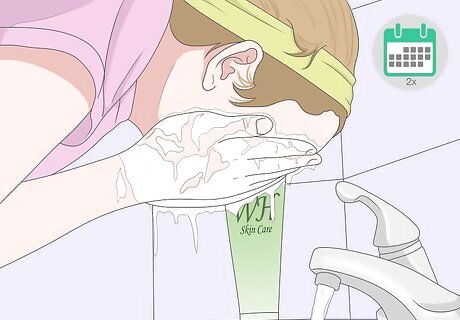
Wash your face at least 2 times daily. Wash your face after you wake up in the morning and before going to bed at night. Use a gentle skin cleanser and warm water to wash your face. You can use your fingertips to apply the skin cleanser or use a soft washcloth. Work the cleanser into wet skin and then splash your face with water 3 or more times to rinse away the soap. Pat your skin dry and apply moisturizer to your face and neck. If you have acne, choose an acne-fighting skin cleanser to wash your face. Then follow it up with a non-comedogenic moisturizer, which won’t clog your pores and is less likely to cause acne.
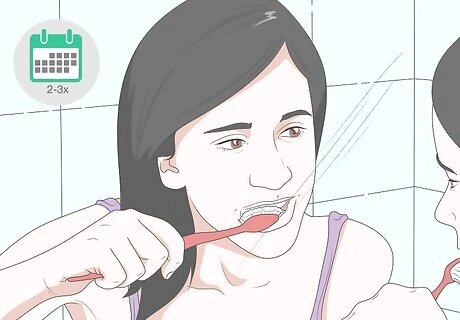
Brush your teeth 2 to 3 times daily. Ideally, brush your teeth after every meal to keep them clean and fresh. However, if this isn't possible, brushing your teeth after you wake up in the morning and before bed at night may be more realistic. Use a fluoride toothpaste and brush the tops, backs, sides of all of your teeth. Spend about 2 minutes brushing and then rinse your mouth with water. Replace your toothbrush every 3 months as well.
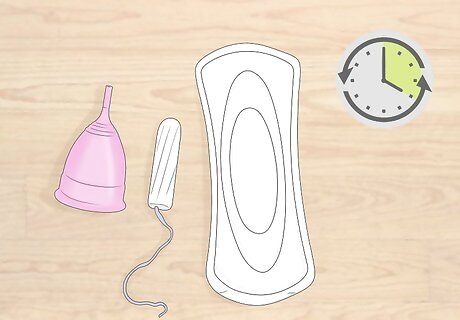
Change your pad, cup, or tampon every 4 hours if you’re on your period. It’s important to change your pad, cup, or tampon regularly when you are on your period, so check it every time you go to the bathroom. If it seems full, change it. This will help to prevent odors and infection. Tampons also carry the risk of toxic shock syndrome if you wear them for too long, so never wear a tampon for more than 8 hours and always go with the lowest level of absorption that you need.
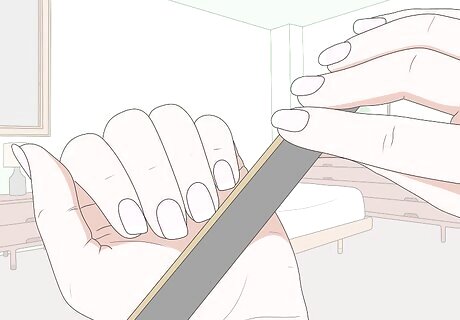
Trim, clean, and file your nails every week. You don’t need to go for a manicure every week, but taking a few minutes to trim, file down, and clean your nails can help to improve your overall hygiene. Use a nail brush to scrub under your nails with soap and water if you like them long since long nails can harbor bacteria. Don’t bite your nails or cuticles! This can damage your fingernails and lead to an infection. You can apply nail polish to your nails if desired. Choose a color that you like and apply 2 coats. Let each coat dry completely after applying it.
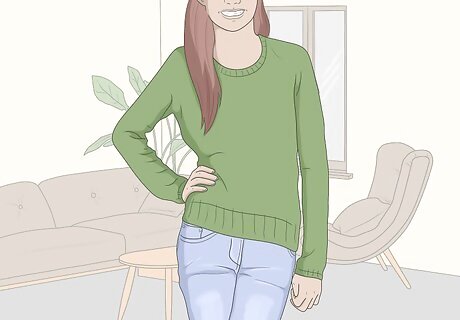
Wear clean clothing that fits you well and makes you feel good. When you dress yourself, make sure to choose items that have been laundered since you last wore them to ensure that they smell good. Also, select items that fit your body well and that you like to wear. Don’t wear clothing that makes you feel uncomfortable or that is painfully tight. Opt for comfortable items that are also practical for what you’ll be doing. For example, if you have school, then a comfortable pair of jeans and a t-shirt or sweater might be the perfect choice. Don’t worry about dressing in clothes that fit a certain trend. Wear items that make you feel good!
Developing Emotional Self-Care Habits
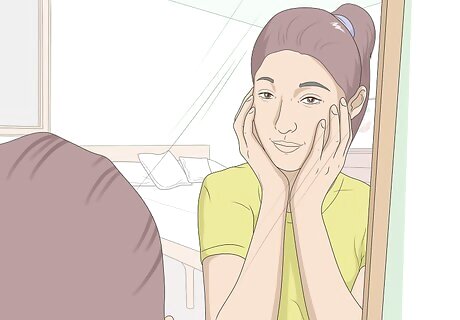
Contradict negative self-talk with positive thinking. Negative self-talk is when you put yourself down or criticize yourself. Everyone does it sometimes, but it’s not good for your self-esteem. Pay attention to when you do this and correct yourself when it happens. To correct negative self-talk, simply contradict the negative thought or statement. For example, if you get a bad grade on a test and catch yourself thinking, “I am so stupid!” stop yourself, take a deep breath, and revise the thought. Try telling yourself something that you might tell a friend who has just gotten a bad grade, such as, “It’s okay! It’s just one grade. You did your best. You can learn from this experience and do even better next time.” Try viewing negative situations with a curious mindset instead! Ask yourself questions like "What needs to change here?" or "Why was this so negative?"
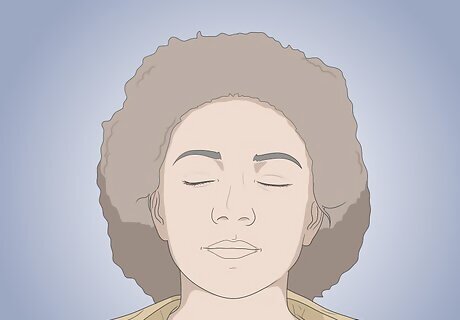
Practice mindfulness to stay engaged with your surroundings. Mindfulness is when you pay closer attention to what is happening right now by using your 5 senses. You can use sight, sound, smell, taste, and touch to help you connect with the world around you, feel more present, and keep yourself feeling calm and happy. The next time you feel overwhelmed or stressed, take a moment to look at the situation using all 5 senses. For example, if you’re feeling stressed while at home studying for a big test, you might stop and notice the feeling of the carpet between your toes, the smell of an air freshener in your bedroom, the taste of your mint chewing gum, the soft glow of a flameless candle on your desk, and the sound of the wind blowing outside.
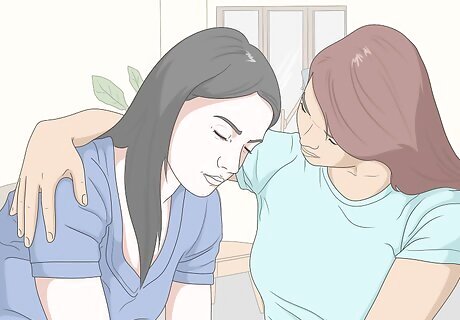
Reach out to people you trust when you’re stressed or feeling down. Talking with someone who cares about you can help you to feel better when things are difficult. Call a trusted friend or family member when you’re struggling with something and tell them how you’re feeling. For example, if you’ve been having a hard time making friends at school, you might tell a friend or family member about this and how it’s made you feel. Try saying something like, “I’m struggling with making friends right now and I’m not sure what to do.”
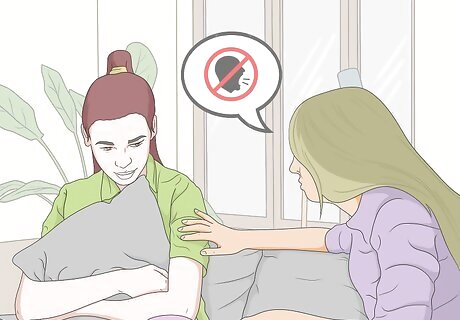
Set and enforce healthy boundaries with friends and family members. Your boundaries are what you will and will not accept in terms of how people treat you. Identify what behaviors you will not tolerate from other people and make it clear to them. Let them know how you will respond if they cross a boundary. For example, if you have a friend who sometimes yells at you when they are mad, then let them know this is unacceptable. Try saying something like, “I understand that you get frustrated sometimes, but it’s not okay to take it out on me by yelling at me. If you do that, I will have to walk away or hang up.” Be sure to follow through with whatever consequences you set. For example, if your friend yells at you, walk away or hang up on them. Don’t give them a second warning. It’s important to stick to your boundaries to show people that you will enforce them.
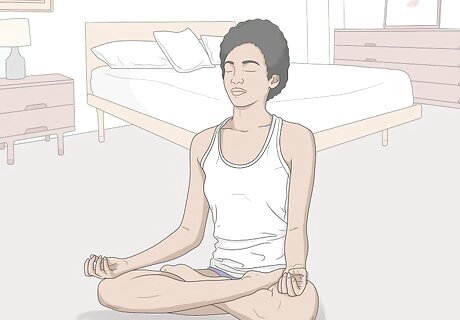
Meditate or pray daily, if you want to develop your spiritual life. Prayer or meditation can be a soothing way to begin or end your day. It’s also a great way to take care of your spiritual needs if you want to develop a spiritual life. Try doing a guided meditation or simply sit in silence for 10 to 15 minutes each day and focus on a mantra or quote that you like. You might also consider joining a church or going to a meditation center once or twice per week.

Keep your personal spaces clean and inviting. Taking care of your possessions and the areas that belong to you, such as your bedroom and locker, is important for your emotional well-being. If these areas are messy and not well-kept, you may feel overwhelmed whenever you look at them. But if you keep them neat and tidy, seeing these areas will be a relaxing experience. Take 15 minutes each day to tidy your personal spaces. Use shelves and organizers to make things look neat and tidy.Tip: Consider donating anything that is cluttering your area that you don’t use, such as old clothes or toys. Or, if your family has a yard sale, ask if you can include some of your items to make a little extra money for yourself.




















Comments
0 comment